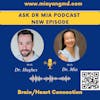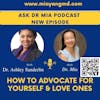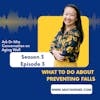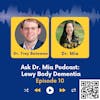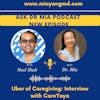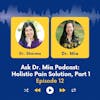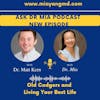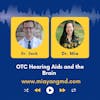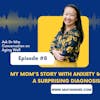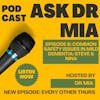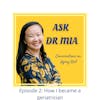What to Do About Preventing Falls

Dr. Mia talks about the other main reason why people end up in nursing homes- "legs not working" aka falls, especially the factors that affect people's balance and what to do about each of the risk factors.
New format of episode with screen share, check out Dr. Mia's new YouTube Channel if you would prefer to follow along visually.
Medications that increase risk of falls
CDC's STEADI program on fall prevention
STEADI program's brochures specifically for patients & caregivers: home safety check list and chair rise exercise
MyMobility plan: plan ahead for mobility changes as we age
How to use Apple Podcast app to subscribe on iPhone- tutorial video
Or subscribe via email on my website: scroll down, on right side.
Music & disclaimer
Transcripts on www.miayangmd.com. Transcripts are automatically generated and may contain minor inaccuracies.
Email: ask@miayangmd.com
Opinions expressed are exclusive of Dr. Mia Yang and not reflective of her or guest speaker's employers or funders.
Dr. Mia (00:01.25)
Thanks for joining this episode of Ask Dr. Mia, Conversations on Aging Well. I am using a slightly new platform to try to be able to share my screen for those of you who might be catching this episode on my new YouTube channel. You can also find me on YouTube now with screen share of future episodes, as well as this episode. Just to provide another dimension, another platform for folks who might prefer to be able to see something besides just hearing. So I will share my YouTube link in the episode description below. But today we're all talking about falls or fall prevention. And I think it's not a surprise to my audience that you might know a lot of people who have fallen.
and not only have fallen, but also had pretty severe injuries from falls. And unfortunately, not only are falls incredibly common, but death due to falls have also increased over time. And, and we know that if people have severe falls or falls that break a bones or break a hip,
oftentimes is not just a bone that is broken, but that it's a permanent change to someone's level of function. As one of my mentors and bosses say, there are two things that can get people moved to a nursing home. If your legs don't work or if your brain doesn't work. And I think we have talked in a number of previous episodes about brain health and ways to treat and prevent.
memory changes. I figured it's about time that we talk about the rest of the body from the head down. So besides how common falls are there are a number of things that we could address to modify or reduce one's risk for falling. It is not something that is bound to happen. But certainly a lot of things can affect our risk for falling.
Dr. Mia (02:24.062)
Certainly as we increase in age, the likelihood of falling increases, but also because of other medical conditions, heart problems, other chronic illnesses that affect our sensation and our feet, arthritis. Sometimes dementia in and of itself can cause people to have problems with balance and falls. And of course, medications, something every geriatrician loves to talk about.
as there are oftentimes a lot of medications, even over the counter meds, that can increase one's fall risk. And we'll talk about those shortly. And then another condition called orthostatic hypotension, meaning that when your blood pressure changes dramatically or lowers dramatically, when you go from a sitting position to a standing position or from a lying position to a sitting or standing position.
And then of course vision, and I would also include hearing problems on there. If we're not able to see, sometimes we can have increased difficulties with balance. Extrinsic fall risk factors include things that are outside of our body. So for example, the shoes that we wear, how slippery the socks are, any sort of home tripping hazards.
Throw rugs is a common one for people to trip over. Sometimes folks have never really been using their cane or walker appropriately, or they think they can use a cane when they really need a walker. Multifocal glasses where you have two different views from the same glasses and switching from a near-sighted to a far-sighted lens can sometimes make people dizzy.
new prescriptions of their glasses, and of course substance use, including alcohol. One thing that is surprising to a lot of the patients I see is that as we get older, our body's ability to metabolize alcohol changes. And even if someone does not feel drunk or tipsy necessarily, it is still affecting their balance and their memory. In older men
Dr. Mia (04:47.906)
the recommended amount of alcohol to drink per day is no more than two glasses of wine or two shots of liquor or beer. And in women, it's actually one drink per day. So that's actually probably lower than what a lot of people suspect. So I like to talk about fall prevention from a toe to head approach.
And this is the way that I teach learners as well, such as internal medicine residents, family medicine residents, or medical students, and of course geriatric fellows. So as we talked about before, socks, shoes, toenails, there's a lot of very long toenails as we get older. Sometimes it can be quite difficult to reach over and cut nails.
And sometimes people don't notice until they go to the doctor and actually see that their nails are curved under. Corns and other bunions can also cause pain and tripping hazard. Of course, arthritis is a huge topic that we're not going to be able to cover in today's episode by itself. But knees, hip, ankle problems, those are very common.
Bowel or bladder issues, so incontinence of urine or stool, or particularly overnight when we get up and try to use the bathroom. It might be dark, you can barely see, get confused, maybe your blood pressure drops a little bit and trip over something in the bathroom, which is a common area where people fall to bathroom. Cardiovascular, so not only the blood pressure issues that we talked about.
but also in terms of arrhythmias and sometimes medications associated with blood pressure. Medications, dentition, sensory changes. So we talked in previous episode about hearing loss and hearing loss is also associated with balance issues because we need our middle ear to be able to tell where we are in space and our head is in space.
Dr. Mia (07:05.066)
And then, of course, cognition. So going back to the feet from a physical exam part, I like to check for what's called proprioception, which is one's ability to feel the tuning fork. And that has actually, it gives me a really good sense of whether or not older adults can feel their feet in the ground.
So oftentimes for balance, we need three different systems working at the same time. We need our vision, we need our vestibular system, which is in the ear, our inner ears, and we need our proprioception, which is why if you ask people who are likely to fall to close their eyes and put their feet together, oftentimes you can see them wobble, which is really a sign of poor proprioception.
And this is sort of a comprehensive way to think through from toes to head. And then of course the extrinsic factors. So you know whether we can install grab bars in a bathroom, get rid of throw rugs, make sure that someone's always wearing non-slip shoes or socks, particularly if they're getting up overnight to try to use the bathroom. Those are easily
those are pretty easy things that we could do to try to prevent falls. And then, for those of you who have not necessarily heard the previous episode, just to touch about hearing loss, there are hearing aids available over the counter now, particularly Costco's one that I hear frequently from my patients, and that it is not...
probably the best way to go if you only have one-sided hearing loss or you have a sudden hearing loss or things that we think is not just age-related hearing changes. Strongly we recommend for people to get an official audiology evaluation. Even though hearing aids are now over the counter, they're still quite expensive and could be a couple hundreds of dollars up to a thousand dollars.
Dr. Mia (09:24.714)
So it is not something that I would recommend just going ahead and purchasing without some sort of audiology evaluation. And again, hearing is very much associated with balance as well as with memory.
Dr. Mia (09:46)
One great resource that I wanted to share with the audience is actually from the CDC. It's a program called STEADI, S-T-E-A-D-I. It's specifically about fall prevention in older adults. And there are a number of different brochures and information sheets depending on if this is a family caregiver or for yourself.
to stay independent and what you can do to help prevent falls. There are even simple exercises like the chair rise exercise. So one thing that I know through my clinical experience that's very common as we get older is that the our quads get weaker with age so we have a harder time standing up.
from a seated position without pushing off with our hands. And that's actually risky because that's when people fall and they're not able to get back up. Oftentimes those are quad weakness and quad exercises are needed, either through a physical therapist or with your local YMCA.
And there are also tips on how to manage the orthostatic hypotension or postural hypertension. And this is where your blood pressure can drop suddenly when you're standing up. And it links to feelings of dizziness or blurry vision. And this is where one can try to remember to get out of bed very slowly. First, sit up and sit on the side of the bed.
and take your time with changing positions before standing up. Sometimes people can also feel a little bit better when they put on compression stockings first thing in the morning before they even get out of bed when their feet are not swollen. And that can help squeeze up the circulation in the lower extremities. And then there are a number of different checklists.
in terms of home safety evaluations. And this is where you can see that there are a number of things to walk through your home and look for items that could lead to fall, such as loose or uneven steps, or asking for an electrician to install a light at the foot, at the bottom of the steps.
and make sure that the carpet is firmly attached to the floor and to add any sort of non-slip rubber threads to the stairs, make sure that there are handrails besides the steps and moving clutter or furniture out of the way so that people don't accidentally trip or throw rugs.
already talked about throw rugs. it's like, no, no. And if there are cords, like telephone cords or extension cords, try to tape them over on the floor so that people don't trip on them. And the kitchen is another place, especially in high cabinets where people store plates and with the holidays coming up.
Sometimes a step stool is not the safest thing for people to step on. And then having light or sometimes there are even motion sensor lights that can be installed in the bathroom so that with motion the light will turn on or a nightlight and then having some sort of non-slip mat added on to the floor of the tub or the shower.
Like I said, that's oftentimes a place where people slip with water and steam and taking a hot shower and all the blood has left your brain and getting out and having a grad bar can be extremely, extremely helpful or even having a shower chair so that you can sit down while taking a shower and prevent getting dizzy. So.
The CDC study resource is a place where brochures are available in both English and in Spanish that I will link in the episode show notes and you can look at that on your own.
So I hope you enjoyed this episode of Ask Dr. Mia podcast. If you have found this information helpful, please take the next few minutes to either share this episode with someone you think would enjoy or leave me a review on Apple podcasts or on my website and to make sure to subscribe to the podcast so that you will get it automatically on your phone.
or subscribe to the YouTube channel all of which will be linked below. If you have additional questions or feedback or suggestions for future topics, please feel free to email me at ask@miayangmd.com and that email address will also be linked in the show notes.
Thank you all and talk to you next time.











